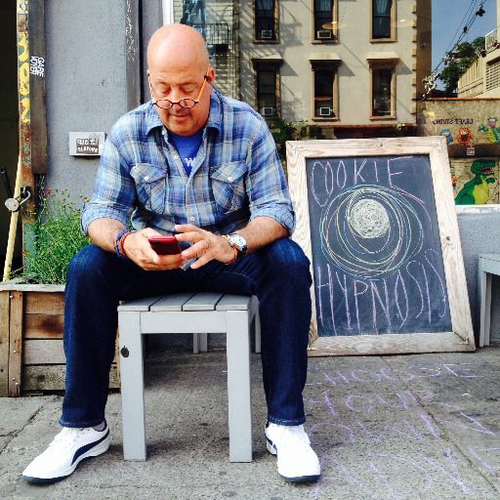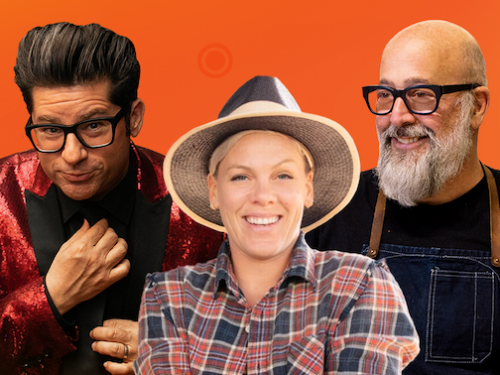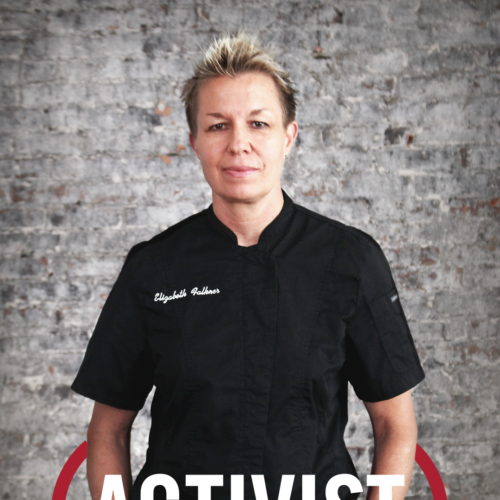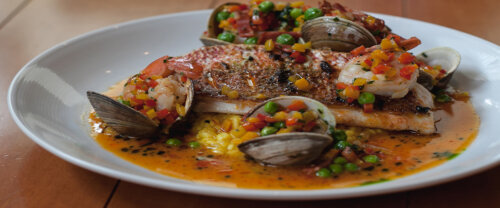EAT (RED): A Conversation with Andrew Zimmern

EAT (RED) Ambassador Andrew Zimmern has eaten many adventurous things during his career as a traveling chef and foodie, but we’ve got one phrase we’re pretty confident he’s never heard before: The key ingredient is socks!
You heard us right. This year for EAT (RED) SAVE LIVES, we’ve teamed up with Bombas to create the perfect recipe to fight AIDS. When you buy a pair of (PRODUCT)RED Bombas socks, not only will 30% of the price go to work on the ground combatting the AIDS epidemic in Africa, but Bombas will also donate a pair of socks to those that are HIV+ and facing homelessness.
(RED) and Bombas sat down with Zimmern to discuss what our shared missions mean to him, and why they pair so well.

(RED):
Can you share why you are passionate about serving and empowering communities facing homelessness?
Andrew Zimmern:
For me it’s personal. I was homeless for almost 13 months in 1990–91 in NYC. I took meals in soup kitchens and shelters, I squatted a building in lower Manhattan and addiction/mental illness/homelessness and recovery are all part of my story. I know how to heal personally, and I’ve learned how to engage civically to solve these problems.
(RED):
How do you view your role in helping the homeless community? Are you about awareness? Education? Fundraising? What is your main goal with regards to a cause that we know is important to you?
AZ:
I do it all. From personal advocacy, one-on-one coaching, attaching my name to a project for awareness, lecturing and teaching about the value of human beings everywhere, and yes, raising a lot of money. I sit on several boards of local and national organizations in an effort to change the dialogue towards making laws that allow the homeless community to reconnect with their communities. We need mental health parity laws, universal health care, we need job programs and housing programs, but what we really need most of all is convincing America that we are all deserving of dignity and respect. Every one of us.
(RED):
We’ve seen you discuss your history of and homelessness and what led you there. And that that experience has colored your current worldview. What are some of your core values or principles that have been colored by that time in your life?
AZ:
Equality. I’ve been up, I’ve been down, I’ve been bad, I’ve been good . . . sounds like a Billy Gibbons song, but I’ve learned we are all truly equal in every way imaginable, so if it came down to one word, that’s it . . . equality. We all deserve several bites at the fruit of equality.

(RED):
We’re big believers in the power of small moments, in creating compassion, in the importance of imparting dignity on the underserved members of our community. What have you learned in your work serving others that could be instructive to help people get involved, or to help people have greater impact in their communities?
AZ:
Please remember that the unwashed, ragged clothed man talking to himself and stumbling around the street or the lady holding a carboard sign at the intersection is me, its you, our parents or our children. The great measure of our society isn’t how we care for the strong, and the ‘haves’, it’s how we care for our least fortunate. And once sprinkled with dignity and respect, amazing things come to pass. I wish everyone could have the experience I had a few years ago bumping into a couple and their two kids at the mall in Minneapolis. They asked if I remembered them, and I said no, and apologized. Turns out it was a couple that were arrested shooting up in their car with their babies in their car seats. They were arrested and jailed, the kids placed in foster care. I worked hard to get them out of jail and into a program where they could get clean, get housing, get job training and get access to legal help for their custody issues. The last I saw of them they were clean, but struggling. 5 years later they were a family again, owned their home and were making a go of it. Saving lives often isn’t dramatic or sexy. It’s just doing what needs doing.
(RED):
What do you think homeless shelters that serve food can do better on that front?
AZ:
Shelters want to serve better food, they cant afford to. We need public and private sectors working together to change the flow of dollars to help those in need. In fact, since we waste 40% of the food in the USA before it comes to the retail supplier maybe we don’t even need a lot of money! Jails, public hospitals, public schools, shelters, senior centers, everywhere the people need the warm hug that food gives the most, they’re being bread-crumbed. It’s shameful.
(RED)
Did you have any experience in your past where small moments of dignity helped you at all in that time of need?
AZ:
Broke, living in a halfway house and barely drawing a sober breath, I attended a meeting and as I was hanging my head down and trying to sneak around the side of the building to enter inside, I was gently grabbed by an elegant older woman in a fur coat and tweed skirt suit. She simply hugged me and said “welcome” at a time I felt unwanted and hopeless. I hadn’t been welcome anywhere in years. Words matter, single words . . . backed up with simple actions.

(RED):
We know you’ve been involved in (RED) for years. Why did you become a (RED) ambassador? Why is (RED)’s mission to help fight AIDS so important to you?
AZ:
(RED) as an organization is professionalized and makes a real difference in the lives of people. That’s why I say yes to anything they ask me to do. AIDS is something that took many of my friends, and medicines ARE available to all. It seems criminal not to try to eliminate AIDS and help all those afflicted.
(RED):
As you know, through the Bombas x (RED) partnership, for every (RED) pair sold, Bombas donates a pair of socks to organizations that support those who are homeless and living with HIV or AIDS, and also contributes 30% of the retail price to (RED)s fight against AIDS, which is enough to provide over 20 days of life-saving medicine to help prevent a mother living with HIV from passing the virus to her unborn baby. Why do you think it’s important for brands and individuals to support causes and do more than just offer a great product or great food?
AZ:
Because people and brands, everyone, needs to stop thinking about themselves and start standing up and acting for others. We all live in the same world. What kind of world do we want to be a part of? I want our world to be one where we all are successful and have the same opportunities.
(RED):
How can people get involved in EAT (RED) SAVE LIVES this June?
AZ:
(RED) has made it so easy for everyone to eat and drink (RED) this June. From pizza to ice cream and aprons to secret pop-up dinners, there are so many ways to help (RED)’s fight to end AIDS! If you want a seat at the table this June, you can learn more about the campaign at RED.org.


